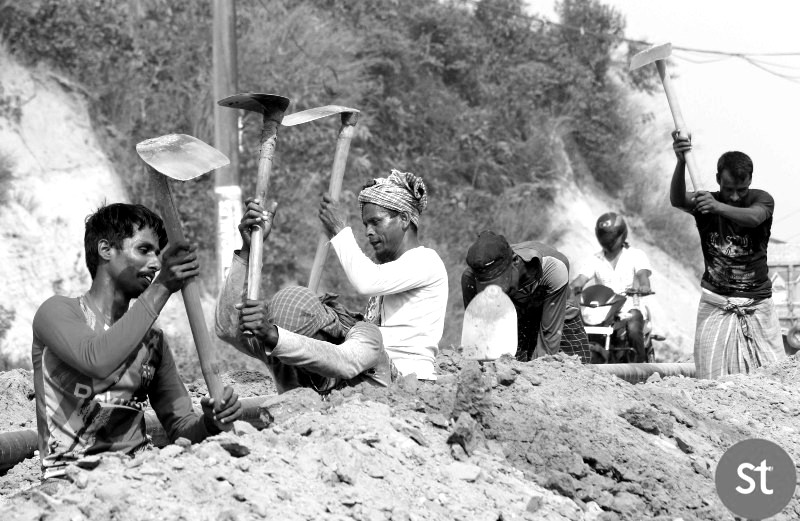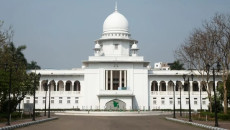
Chowdhury Kabir
02 May, 2025 14:52
Red Over the Fields: Why May Day Still Matters
A poetic reflection on labor, dignity, and the silent backbone of society

On May 1st, the world pauses—if only briefly—to remember the hands that build, carry, till, sew, and serve. But do we truly see the people behind the work? Or has May Day become just another date on the calendar, stripped of its struggle, reduced to hashtags and hollow statements?
International Workers' Day, or May Day, marks more than just a historical moment. It stands as a living, breathing memory of resistance and resilience. The day originated in the aftermath of the Haymarket affair in 1886 Chicago, where workers demanding an eight-hour workday were met with bullets and blood. What began as a demand for basic human decency soon became a global movement for labor rights, pushing back against the machinery of exploitation.
Yet, more than a century later, how much has changed?
Across Bangladesh's garment factories, India's construction sites, and the gig economies of the West, laborers still trade their lives for minimal wages. Safety is negotiable. Breaks are a luxury. A voice is a threat. Even in so-called "developed" nations, union-busting, wage theft, and unsafe conditions continue to haunt the working class. May Day, in this light, is not just remembrance—it's relevance.
There’s no statue for the man who dies carrying cement in the summer heat. No anthem for the woman who stitches 500 shirts a day for a brand that won't acknowledge her. Their dignity lies not in accolades but in survival—and that is precisely why May Day must be preserved, observed, and amplified.
Let us look beyond the symbolic red flags and raised fists. Let us see the poetry in labor:
- "Not the kind in books,
- But in calloused hands gripping lunch in a tin can,
- In tired eyes brightening at a child's laughter,
- In backbones bent not in submission, but in strength."
To labor is to live deliberately. It is a conscious act of shaping the world, often without recognition. The farmer does not wait for applause to sow seeds. The nurse does not demand bouquets for holding dying hands. These acts of service, though ordinary, hold extraordinary grace.
May Day, then, is not a communist echo or socialist throwback. It is a human necessity. It is a reminder that no skyscraper was built by CEOs, and no nation thrives without its workers. Every luxury sits atop invisible shoulders. And unless we name them, thank them, and protect them—our gratitude is hollow.
In recent years, the pandemic taught us who the "essential" workers really are. They were not the billionaires. They were the ones driving ambulances, stocking grocery shelves, delivering food, and risking exposure. They kept the world breathing while many stayed home.
But once the applause faded, so did the attention. May Day must bring it back. Because justice delayed is justice denied—and workers have waited long enough.
As we move forward, let us reshape how we view labor. Let us teach our children that dignity is not tied to titles, but to effort. Let us support policies that ensure fair wages, safe conditions, and the right to organize. Let us remember that labor rights are human rights.
This May Day, don't just post a quote or share a graphic. Tip your delivery person. Thank the cleaner. Question the systems that treat laborers as expendable. Change begins not in parliament, but in perspective.
Because behind every comfort you enjoy, someone worked—and often suffered—to provide it.
Let May Day not be a whisper of the past, but a roar for the future.
The Fire Beneath the Machines
There’s no statue of the garment worker.
No song for the man hauling bricks under a burning sun.
Yet every thread of our comfort is sewn by the invisible.
May Day began not in celebration,
But in blood and resistance—
Chicago, 1886.
Eight hours of work. Eight hours of rest.
Eight hours for what we will.
That was the cry. That was the fight.
But what of now?
In Dhaka's factories,
In Delhi's kitchens,
On New York's delivery bikes—
Workers still trade life for wage,
Sweat for dignity,
Silence for survival.
And yet, there is poetry in labor.
Not the kind in books,
But in calloused hands holding lunch in a tin can,
In tired eyes looking forward to a child’s smile.
Labor is not just economic—
It is spiritual, historical, and deeply human.
To work is to shape the world.
To resist is to reclaim it.
Why May Day Still Matters
Because the work didn’t end in 1886.
Because the 9-to-5 isn’t universal.
Because millions still work without contracts,
Without safety,
Without thanks.
Because every year,
Someone dies building someone else’s comfort—
And the world forgets their name.
May Day is memory.
May Day is mourning.
May Day is a demand:
To be seen.
To be valued.
To be heard.
Note
This piece is not just about labor laws or history. It’s a whisper for those whose voices are often lost in noise. If this resonated with you, share it, say their names, and tip your delivery worker today.
I write this from a country where thousands of laborers form the foundation of our economy, yet remain unseen. Their stories deserve not just sympathy, but solidarity. If this piece speaks to you, share it. The revolution doesn’t always roar—sometimes, it knocks gently at your door.







 সিলেট সিপিবি সাধারণ সম্পাদক সুমন ‘আটক’
সিলেট সিপিবি সাধারণ সম্পাদক সুমন ‘আটক’ 




 IT Lab Solutions Ltd.
IT Lab Solutions Ltd.
আপনার মন্তব্য